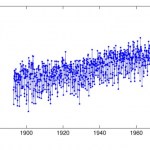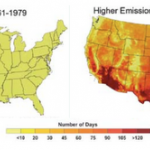drought
I would almost count it unethical that the New Scientist has a thing that looks like a blog post (an article you can comment on) that has some science in it, but that you have to be a paid subscriber to comment on. WTF New Scientist? What are you trying to pull?
But that's OK, I've got a blog and can comment here.
Link between global warming and drought questioned
14 November 2012 by Fred Pearce
THE world has been suffering more droughts in recent decades, and climate change will bring many more, according to received wisdom.
"Received Wisdom" means stuff we were told, passed down to us from…
Bacon. Photograph by Flickr User Kentbrew
It appears that there is going to be a bacon shortage. It is estimated that the total amount (in poundage, I assume) of swine that will be produced next year will be several percent, about 10% most likely, less than expected. It is said that there will be an approximate doubling of the cost of pork production, not necessarily doubling the cost of bacon and other products at the consumer end, but certainly squeezing the farmers and raising costs in the grocery store significantly. Presumably this will mean a shortage of all pork products, and quite…
I'd like to give you a very small selection of references and discussions about the link between global warming and drought.
Global warming probably has two major effects. First, more moisture gets into the atmosphere because warmer air passing over the oceans can take in more water. This can cause more rain and possibly more severe storms and flooding. But the atmospheric system also changes in another way. The hydraulic cycle, as it is called, intensified in both directions, wet and dry. If you live on the East Coast of the US and you move to where I live in the upper Midwest, you'll…
Christian Parenti has a really good article in TomDispatch about the reasons why Climate Change may change people'st thinking about the role of government:
Global warming and the freaky, increasingly extreme weather that will accompany it is going to change all that. After all, there is only one institution that actually has the capacity to deal with multibillion-dollar natural disasters on an increasingly routine basis. Private security firms won't help your flooded or tornado-struck town. Private insurance companies are systematically withdrawing coverage from vulnerable coastal areas.…
Hui Min Neo reports for AFP that 10 million people in the Horn of Africa are affected by the region's worst drought in 60 years. Djibouti, Ethiopia, Kenya, Somalia, and Uganda are suffering severe food shortages, and malnutrition rates are rising.
The UN Office for the Coordination of Humanitarian Affairs reports that tens of thousands of Somalis - who are facing armed conflicts as well as drought and soaring food prices - have fled to Kenya and Ethiopia. But Kenya and Ethiopia have also been experiencing poor rainfall and are facing rising high food prices and increased water shortages. OCHA…
This is about the paper of the same name by A Dai, available from http://www.cgd.ucar.edu/cas/adai/papers/Dai-drought_WIRES2010.pdf.
To keep things in one place, here is the abstract:
This article reviews recent literature on drought of the last millennium, followed by an update on global aridity changes from 1950 to 2008. Projected future aridity is presented based on recent studies and our analysis of model simulations. Dry periods lasting for years to decades have occurred many times during the last millennium over, for example, North America, West Africa, and East Asia. These droughts…
Stuart Staniford is turning his customary care and attention to recent climate change drought projections, and the results are frightening, but also critically important. There's a summary of his posts on this subject here - read them all.
Sharon
Remember the global food crisis of 2008? Disappointing wheat harvests in Europe, the US, and Australia led to a shortfall in global supplies, and poorer countries and consumers couldn't afford grain that had suddenly become much more expensive. In the US, families struggled to stretch their food budgets; in 14 other countries, food-related violence erupted.
Memories of that recent crisis have stirred as Russia (which suffered from drought this summer) has banned exports of its wheat and other countries have faced droughts or flooding. After the cost of bread jumped 30%, riots broke out in…
One of my hobbies lately has been to get either RNA seq or microarray data from GEO and do quick analyses. Not only is this fun, I can find good examples to use for teaching biology.
One of these fun examples comes from some Arabidopsis data. In this experiment, some poor little seedlings were taken out of their happy semi-liquid culture tubes and allowed to dry out. This simulated drought situation isn't exactly dust bowls and hollow-eyed farmers, but the plants don't know that and most likely respond in a similar way.
We can get a quick idea of how the plants feel about their situation…
I have an enormous amount of respect for Stuart Staniford, who I think is one of the best minds working on our collective ecological crisis. That said, we've had some serious debates, because I've tended to think that our situation, particularly our longer term food situation, is more serious than Staniford has - but those debates on my end have always included just a profound gratitude for the kind of analytic work he does.
(Days over 100 degrees in projected high emissions scenarios)
Staniford has done a fabulous review (Note: apologies for linkage problems, they should now be fixed!)…
At first glance, swept yards, derived from Africa, at one time traditional in the south and now mostly the province of a few, aging African-American southerners; and Cottage Gardens, invented in Britain under the feudal system and now evolved into a trendy " flower garden style" meaning mostly a mix of abundant plants and mulched paths as seen in any supermarket magazine, have nothing to do with one another.
But looking past the obvious, the two of them have a great deal in common indeed. Both emerged from the need to make good use of a comparatively smaller piece of land for a family with…
I recently wrote about the tragic bushfires in Australia and how it seems to me that it is reasonable to ask if this would have happened without anthropogenic climate changes.
Real Climate has the details on this in their latest post: Bushfires and extreme heat in south-east Australia.
The post is by David Karoly, Professor of Meteorology at the University of Melbourne in Australia. He identifies four factors in the fire's ferocity - maximum temperatures, relative humidity, wind speeds and the ongoing drought - and discusses the possible role of climate change in each of them. For three of…
As I mentioned briefly before, I have just returned from Australia and as you could imagine, the heatwaves and wildfires were a hot topic(how funny am I?).
So the death toll is expected to exceed 200 people. Southern Australia has been experiencing extreme drought for many years now, so the whole place is a tinder box. Increased risk of wildfires is an anticipated, and probably already observed, consequence of global warming.
You are never on solid ground when attributing a particular extreme event to such a slow moving change in the average of all events, which is what climate change is,…




